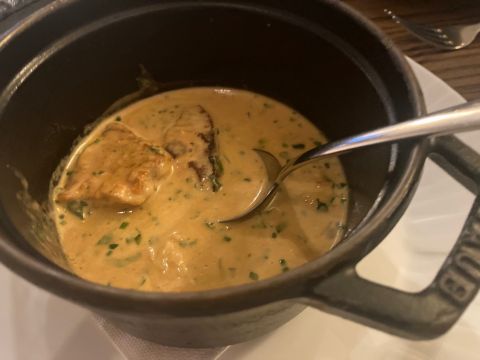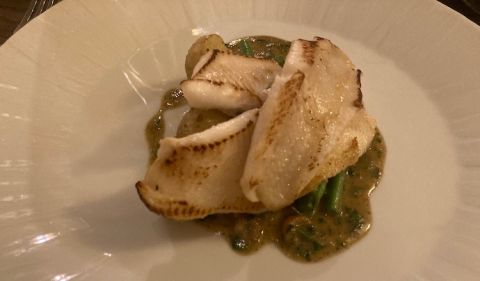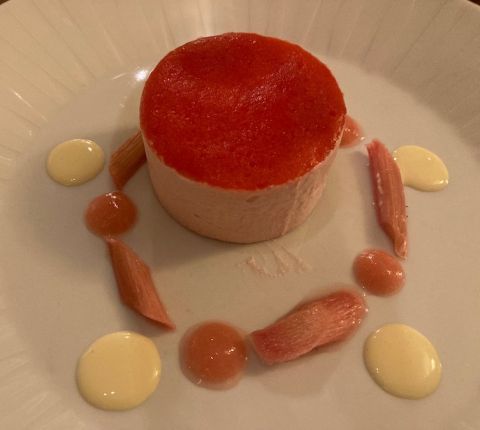Hill of The Walnut Tree

What does it take to make a great chef?
I was left considering the possible answers to this question after a cup of coffee at 9 am last week in the lobby of the Angel Hotel, Abergavenny in Wales. Opposite me was the smiling face of Shaun Hill, who undeniably has earned this moniker and yet he would undoubtedly be the first person to gainsay it.
Modesty, a quality that Hill has in spades, has to play a significant part: if you think you are great, then undoubtedly you are not. Longevity is also key. Despite his smile, and his full head of (albeit grey) hair, Hill is 75 and is still at the stoves four days a week – although he would like to reduce that to three. (On the afternoons between shifts, Hill apparently retires somewhere quiet with a gin and tonic, which may be another contributory factor!)
Hill’s resumé is impressive. In 1966, when straight out of university, he began cooking in London under Robert Carrier, then cooked at the Gay Hussar and Blakes Hotel, also in London, before in the early 1980s becoming head chef at Gidleigh Park, Devon, where the owner Paul Henderson had begun to put together an extraordinary wine list, which obviously appealed to Hill.
His own wine lists at his previous establishment, the Merchant House in Ludlow, and today at the Walnut Tree Inn just outside Abergavenny, also show off Hill’s humanity. There is not much point in spending as much time as it takes to cook the best ingredients if what is in your glass disappoints, is very much Hill’s mantra. And his current wine list is a gem.
There is not much by way of explanation – I can almost hear Hill muttering ‘if you’re old enough to drink, then it’s up to you’. And Hill makes the choice even more difficult by packing his wine list with some wonderful options. Under the heading Core White there is an English Chardonnay from Lime Bay (£64), a Collioure blanc 2014 from Domaine du Traginer (£72) and Jermann’s Vintage Tunina 2019 (£98). Under the Core Red heading there is a Chinon 2018 from Charles Joguet (£52), a German Pinot Noir from Louis Guntrum 2018 (£46) and a 2019 Trousseau from Domaine des Dolomies in the Jura (£62). There are also a couple of compilations under the headings Classic Reds and Classic Whites, the latter of which includes a Riesling Cuvée Frédéric Émile 2013 from Trimbach (£88), which my guest and I had drunk with great pleasure the night before at The Walnut Tree.
Perhaps it was because I had eaten Hill’s food often before that I knew a Riesling would work so well with anything we chose from his current menu. He, as a chef and enthusiastic traveller, has spent the past 40 years in locations far from the most likely, where he has picked up not only flavour combinations but also new techniques as well as pure inspiration. In the 40 minutes we chatted at The Angel, the following locations were mentioned by Hill as among the favourite places he had visited and that had proved to be the most inspiring destinations: Tashkent, Damascus, Palmeira, Kyiv, Sikkim and Bhutan – a pretty fascinating and eclectic list.
All these experiences contribute to making any Hill menu an exciting read but there are two other factors which subtly play their part. First of all the menu at The Walnut Tree will be elegantly written and devoid of any typos or spelling mistakes. ‘I get infuriated when I see an s missing from petits fours’, Hill once told me. This approach stems from Hill’s father, a journalist and scriptwriter, who has quite obviously imbued his son with a love of the English language and its correct usage.
The second is the definitive nature of why Hill and his team are cooking and why you, the customer, have taken the time and trouble to visit: it is for enjoyment, pure and simple, particularly as The Walnut Tree, deep in the Welsh countryside, is not exactly in the most convenient location. ‘We are here to cook for you and we are here to enjoy it’, Hill explained. ‘I have always believed that it would be very silly not to cook what you, the chefs, like to eat, because how else can you tell whether it’s right or not?’
So Hill’s current menu, invariably finished just as the first customer is being shown to the table, packs a range of ingredients and combinations. First comes the protein, then its correct accompaniments, and there will always be room for Hill’s two favourite ingredients, offal for its versatility and shellfish for its sweetness, with scallops his particular favourite.
Offal manifested itself elegantly in one first course, veal sweetbreads with pig’s head cromesqui, while I enjoyed the Cornish fish bourride served in a distinctive black Staub dish shown above. This was a most satisfying dish. When I mentioned this the following morning to Hill, he smiled and said that it had taken him a while to get this dish right. He’d broken it down into its constituent parts, substituted chicken stock for fish stock and the dish has been popular ever since.
I moved on to lemon sole with brown butter sauce and shrimps. Sole, in its many forms, is a fish that I have long associated with Hill: it is a gentle fish that has to be treated gently and here again it was. The fish was filleted, quickly grilled before being placed on a small pile of Jersey royal potatoes and green beans. And the sauce was the perfect foil for the wine.
The desserts at the Walnut Tree present a particular challenge: they are invariably so good that it almost feels wrong to order just one. Dave Pope is in charge of this section and he deserves great praise. In the end we reluctantly chose a sherry trifle that was predominantly cream and a rhubarb parfait, in which the fruit provided the perfect acidic accompaniment. I would, however, happily go back for any of the other five desserts on offer. I paid my bill of £235, excluding extremely personable service, and we left extremely happy.
Hill is unquestionably modest but he possesses an image of himself and his talents that has stood him in very good stead. The Walnut Tree initially became famous thanks to the cooking of Franco Taruschio and the warmth generated by his wife Ann, who ran the restaurant for 30 years before selling it in 2001 to a team who could not manage it and were forced to close in 2007. When Hill was approached by local hotelier William Griffiths to reopen The Walnut Tree, Hill appreciated that enough time had passed for any possible comparisons between his and the Taruschio era to have been long forgotten.
Of such diverse qualities as these, great chefs are made.
The Walnut Tree Inn Llanddewi Skirrid, Abergavenny NP7 8AW; tel: +44 (0)1873 852797. Open for lunch and dinner Wednesday to Saturday. Booking essential.
Become a member to view this article and thousands more!
- 15,399 featured articles
- 274,790 wine reviews
- Maps from The World Atlas of Wine, 8th edition (RRP £50)
- The Oxford Companion to Wine, 5th edition (RRP £50)
- Members’ forum
- 15,399 featured articles
- 274,790 wine reviews
- Maps from The World Atlas of Wine, 8th edition (RRP £50)
- The Oxford Companion to Wine, 5th edition (RRP £50)
- Members’ forum
- Commercial use of our Tasting Notes



